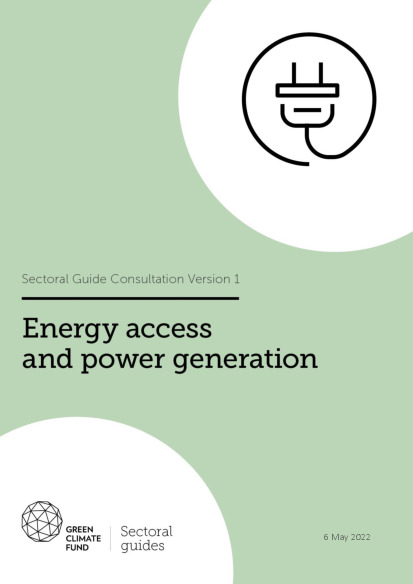Sectoral guide: Energy access and power generation
The energy sector is one of the largest contributors to greenhouse gas emissions due to the world’s reliance on fossil fuels (around two thirds of global emissions are from the energy sector). At the same time, hundreds of millions of people still lack access to electricity, and a third of the world’s population lack access to clean energy sources for cooking. To limit global temperature increases to 1.5°C as well as meet the sustainable development goals, the energy sector must undergo a paradigm shift, transitioning from unsustainable fuelwood, coal, oil, and gas to modern renewable energy as highlighted by the International Energy Agency.
Despite increasingly competitive costs for renewable energy technologies, multiple factors in developing countries impede investment at scale. Developers and financiers are often exposed to uncertainties in long- term planning, policies and power market regulations. Direct or indirect government support and subsidies to incumbent energy suppliers make renewables seem less competitive. There are also technical limitations in the capacity of national power grids to integrate and manage in particular intermittent renewable energy and ensure that supply can be matched with demand.
Three distinct paradigm-shifting pathways can deliver significant paradigm shift in the Energy access and power generation sector: (1) low emission power generation, efficient, reliable energy transmission, distribution, and storage, (2) efficient, reliable energy transmission, distribution, and storage, (3) promoting access to modern renewable energy. GCF aims to leverage its range of financial instruments to de-risk renewable energy investments, reduce the cost of financing and thus the expected rate of return required by investors to improve affordability to end-users and accelerate the transition to renewable energy technologies. To deliver a paradigm shift, GCF will deploy its financial resources to address barriers in a systemic way beyond a single project. The fund can deploy several financial instruments that can be coordinated with co-financiers, blended, and sequenced in order to leverage other public and private capital. GCF’s readiness grants can support energy sector planning and reforms.
The sectoral guide draft was released for consultation between March 2021 and July 2021. The Secretariat received more than 350 suggestions and recommendations which are addressed in the current version of the guide. The sectoral guide will be submitted to the GCF Board for its consideration in 2022. In the meantime, GCF remains open to further feedback on this draft. For further inquiries please contact us via: [email protected].
